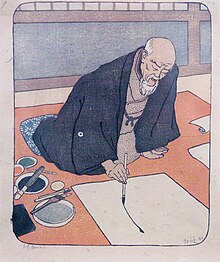Kanō Tomonobu

Kanō Tomonobu (狩野 友信, 24 April 1843 – 15 July 1912) was a Japanese painter of the Kanō school. He used the art names Shunsen (春川) and Isseisai (一青斎).
Life and career
[edit]Tomonobu apprenticed under the official painter for the shōgun (the oku-eshi) in 1859, at age 16.[1]
On the suggestion of his brother-in-law Kawada Hiromu, the governor of Sagami Province, who had travelled to France as part of a shogunal delegation, Tomonobu studied Western painting at the Foreign Studies Centre for two years beginning in 1863. He then spent three years beginning in 1865 at the school of Kawakami Tōgai, and while there studied with the English artist Charles Wirgman for two years. He helped the American art historian Ernest Fenollosa in his studies of Japanese art and introduced Fenollosa to the painter Kanō Hōgai.[1]
Tomonobu worked at the Ministry of Popular Affairs in 1870. He taught at the University of Tokyo in 1877, the Tokyo University Preparatory School in 1880, the Tokyo School of Fine Arts in 1889.[1]
References
[edit]- ^ a b c Conant 2006, p. 88.
Works cited
[edit]Further reading
[edit]- Yamada, Kumiko (March 1999). "Kanō Tomonobu: Meiji wo ikita saigo no oku-eshi (1): oitachi, shugyō, oku-eshi jidai, sakuhin" 狩野友信 ─ 明治を生きた最後の奥絵師(一) ─ 生い立ち・修行・奥絵師時代・作品. Lotus 日本フェノロサ学会機関誌 (in Japanese) (19): 1–28.
- Yamada, Kumiko (December 2000). "Kanō Tomonobu no Meiji: oku-eshi kara Nihonga kyōshi e" 狩野友信の明治─奥絵師から日本画教師へ. 近代画説 明治美術学会誌 (in Japanese) (9): 148–167.
- Yamada, Kumiko (March 2002). "Kanō Tomonobu: Meiji wo ikita saigo no oku-eshi (2): rainichi gaikokujin gakka to no kōyū" 狩野友信 ─ 明治を生きた最後の奥絵師(ニ) ─ 来日外国人画家との交遊. Lotus 日本フェノロサ学会機関誌 (in Japanese) (22): 1–30.
